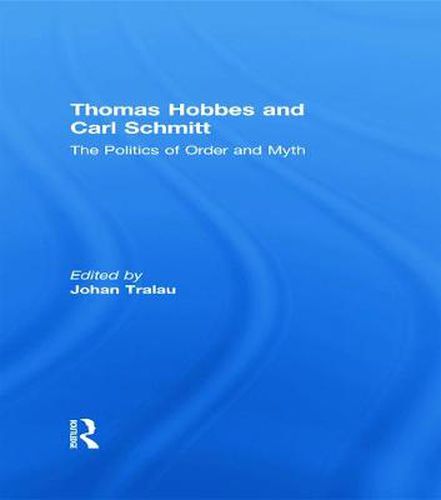Readings Newsletter
Become a Readings Member to make your shopping experience even easier.
Sign in or sign up for free!
You’re not far away from qualifying for FREE standard shipping within Australia
You’ve qualified for FREE standard shipping within Australia
The cart is loading…






Thomas Hobbes, the English 17th century philosopher, and Carl Schmitt, Hitler’s ‘crown jurist’, a political thinker and author of an enigmatic book on Hobbes, are increasingly relevant today for two reasons. First, they address the problem of political order, so important when we witness failed states, the privatisation of war, and the rise of political violence that does not derive from the state. Secondly, they are both crucial sources for the use of mythology in politics; moreover, they address the key issue of our time, namely, the relation between politics and religion. This collection of important new essays addresses Hobbes and Schmitt as political thinkers, their importance for present-day politics and society, their conceptions of myth and politics, and Schmitt’s use of Hobbes in (and some say against) the Third Reich. When myth, violence and revelation re-emerge as political forces, it is important to understand Hobbes’s and Schmitt’s answers to the problems of their time - and to those of ours.
This book was based on a special issue of the Critical Review of International Social and Political Philosophy.
$9.00 standard shipping within Australia
FREE standard shipping within Australia for orders over $100.00
Express & International shipping calculated at checkout
Thomas Hobbes, the English 17th century philosopher, and Carl Schmitt, Hitler’s ‘crown jurist’, a political thinker and author of an enigmatic book on Hobbes, are increasingly relevant today for two reasons. First, they address the problem of political order, so important when we witness failed states, the privatisation of war, and the rise of political violence that does not derive from the state. Secondly, they are both crucial sources for the use of mythology in politics; moreover, they address the key issue of our time, namely, the relation between politics and religion. This collection of important new essays addresses Hobbes and Schmitt as political thinkers, their importance for present-day politics and society, their conceptions of myth and politics, and Schmitt’s use of Hobbes in (and some say against) the Third Reich. When myth, violence and revelation re-emerge as political forces, it is important to understand Hobbes’s and Schmitt’s answers to the problems of their time - and to those of ours.
This book was based on a special issue of the Critical Review of International Social and Political Philosophy.